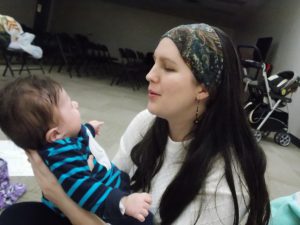The Birthday Cake My Mother Didn’t Make
When I found out that my mother had given birth to a boy – her sixth and last child – I turned my face into the wall and cried. Not tears of joy, but indescribable disappointment. At age nine, I realized the new baby would change the ratio of male to female children in the family – 4:2 – and skew the balance forever. I’d already learned that boys had way more power than girls.
My brothers, for example, had the power to mesmerize our parents weekend after weekend, playing baseball and soccer, while I languished in the bleachers wishing I were somewhere else. My brothers could slug me for absolutely no reason and then fake-whine that I had started it. And most irritatingly, they would bow their knees out a mile in the back seat of our station wagon, “man-spreading,” with no regard for their sister’s more modest tendencies.
As if it were not terrible enough to have another boy in the family, I learned that my brother’s Valentine’s Day birth had been a Cesarean delivery. To me, the word meant only that my mother would not be home from the hospital in time for my birthday, only four short February days away.
A feeling of grief settled in my stomach. Even the teachers at my school reminded me of the latest enemy-addition to our family: “I hear you have a new baby brother!” they said with sickeningly sweet smiles. Up to that time, school had been my solace, my escape, where I could imagine being an only child – a kid whose parents reminded her to drink her milk, instead of yelling, “Shut the refrigerator door!”
My anxiety worsened by the day. No mom equaled no birthday cake. My dad – a well-meaning man who hammered nails for a living and created large, lasting structures – was by no means capable of measuring and sifting flour into a bowl for the purpose of making something that would be consumed in a day. Not without having a nervous breakdown.
And then, just before supper on my birthday. everything changed. Continue reading
Disconnected: When Elderly Parents No Longer Engage
The rainbow appeared in the midst of a sun shower and stretched across the sky. I stood for a moment at the grocery store entrance, then made a run for my car. After unloading a few bags, now dripping wet, I drove the half-mile to my mother-in-law’s assisted living facility. I had to drop off her things. Most of all, I wanted her to see the rainbow.
I parked under the covered entrance, gathered up her sacks of paper towels, tissues, Fixodent and yogurts, and hustled inside.
I found my mother-in-law walking down the hall. She seemed flustered, perhaps because of my sudden appearance outside the elevator; normally, I knock on her door. 
Come and see the rainbow! I said, excited that she should get a glimpse.
She was on her way to the game room to watch a movie with her next door neighbors, a couple of gentlemen friends, one in a wheel chair, and the other in his 90s, just padding along.
But she’d forgotten where she was going. We’re going to be late for dinner! she declared with a hint of desperation.
I’ve discovered that the slightest bit of anxiety can hinder her cognition. So I reminded her: You’ve already had your dinner. And it was true. It was already past 6:30.
Inside the game room, I raised the mesh window shade. The rainbow was still there, floating above the Safeway parking lot and all the eastern plains. In fact, it was brilliant. Look outside, I said. Take a look at the rainbow!
My mother-in-law slid into a chair. Instead of engaging, she looked away from where I was standing. Her flat expression told me she was not at all interested.
The older gentleman disregarded my invitation as well. Movie in hand and stone-faced, he shuffled over to the DVD player. The younger man squinted up at the window. Without commenting, he wheeled himself away.
It took too much energy, it seemed, for any of them to witness this miracle. Here I was, the interloper, trying to show them a damn rainbow. So I lowered the window shade and went to put my mother-in-law’s things in her apartment.
When I returned to the game room, the previews were playing. All eyes were fixed on the big screen TV. It was time for me to go.
My mother-in-law stays indoors all day. There’s no place where she can connect with Nature. Except for the two or three live plants that she either over-waters or lets die of dehydration, there are no growing things in her small apartment. She no longer cares about going out, and complains that walking tires her legs. She definitely doesn’t want to see or hear anything new. It’s too much to deal with. Too exhausting.
The nightly movies might play before her eyes but she remembers nothing about them. She goes for the companionship, because she wants to be with the two gentlemen who live next door, and not alone.
The lack of connection with Nature, which provides invaluable stimuli through the senses, has taken its toll. The parts of the brain activated by the senses – sight, touch, taste, smell, and hearing – are being engaged less and less as she physically declines. Her world is shrinking.
Memories are made when we engage our senses. The less we engage the senses, the fewer new memories we will make. That’s why it’s so important for children to play outdoors, splash in mud puddles and build tree houses. To have pets. And for parents to brush their hair and scratch their backs.
In addition to making memories, these things bring joy. They keep us alert and engaged with the world around us.
But there may come a time when the senses are dulled by either age or failing minds. By a lack of stimulation. It becomes a burden for some elderly people to witness the unfamiliar. To muster a show of interest or emotion. Instead, they sit in their rooms, no longer excited about anything. I see this frequently where my mother-in-law lives. Folks will say, I’ve already been there, done that.
A few weeks ago, I tried to interest my mother-in-law in a new reclining chair. I went shopping, showed her pictures. She was OK with the idea – at first. Until she came to the realization that the chair would actually be delivered to her living room.
Do I have to have a new chair? she asked.
The thought of a new chair in the room had upset her, although she really needs one. Only the old is comfortable now.
And I realized that for her, the past has become the present. And nothing new, nothing happening for the first time, matters anymore.
Not even a rainbow.
Her brain can only make peace with the old, the familiar. But I will continue to show her new things. Pretty things. Because it’s important to me. No matter the state of my mother-in-law’s brain or physical body, I will try to help her drink up the joy. Even if she only takes the tiniest sip. FFG
All material on this website is copyrighted by familyfieldguide.com, and may not be reprinted or reproduced in any form without permission.
When Love Disappears at the Border
Children, some experts say, are usually able to adapt to their parent’s level of ability to care for them. But I cannot believe they ever get over being abandoned. I know this because abandonment has played a huge, though mostly silent, role in my own family history. It’s something no parent or grandparent wants to talk about. The pain is just too great.
To children who are sent away from their parents, abandonment is just what it feels like. They trusted those adults to love and care for them. And that bond of trust has been broken. Regardless of the revolving facts our president would like us to believe, children don’t understand politics. They understand love.
Children understand love through the smiling eyes of a mother and father, and through the anticipated daily routine that brings rhythm and stability to their young lives. Children feel love from all the small things parents do, like making them something good to eat, washing their little faces and hands, singing songs and telling stories. This is what builds healthy, secure attachment. This is what makes children feel they are important and safe in the world.
So, yes. I am enraged. Livid. That bonds so lovingly created within the family unit have been crushed at the border. That children’s attachment to primary caregivers has been so recklessly endangered by our president, and torn asunder by his ICE lackeys as though this sacred trust was a disposable commodity.
These legalists know nothing of empathy and compassion. If they did, they would turn it all around instantly, because love knows no borders. No boundaries. The means to prevent this atrocity has always existed. But no one has had the political chutzpa to do anything about it.
I remember sitting with my grandmother in her tiny New Jersey kitchen, my tape recorder on “play,” while I held my sleeping three-year-old daughter. Continue reading



